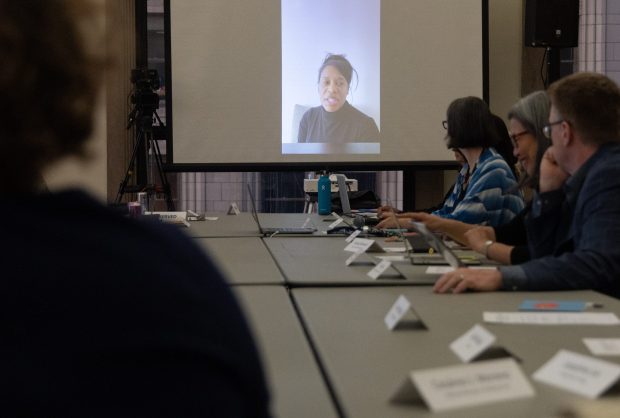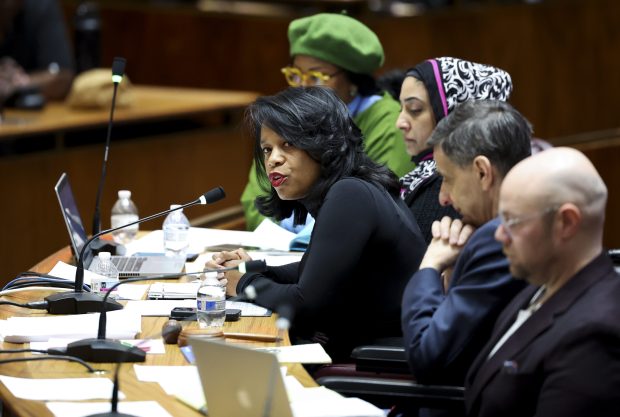As Chicago’s Department of Cultural Affairs and Special Events gears up for another highlight-packed summer, its leader is laying out her vision for the city’s arts community as she responds to criticism that has been simmering since she took office.
A contentious exhibition, staff complaints and public flak from some arts leaders have tailed DCASE Commissioner Clinée Hedspeth since her March 2024 appointment by Mayor Brandon Johnson. Addressing the controversies in an interview with the Tribune for the first time, Hedspeth said she has reflected, but pushed back against much of it as unfounded.
“I think I did walk into a hostile situation,” she said.
Meanwhile, Hedspeth is doubling down on a top focus to get artists more money. The department has earmarked an extra $500,000 for grants to artists, in addition to the $7 million allocated by the City Council last fall, she said.
“As much as we talk about water services, as much as we talk about infrastructure, this is the same. This is on par,” Hedspeth said of direct payments to artists and small arts organizations. “This is vital. This is a service to be able to provide people with funding to create and capture who we are as a city.”
Hedspeth is proud of having secured the extra money, given Chicago’s thorny fiscal outlook. Johnson and the City Council budgeted $7 million for the grants, $1 million more than the year before, but less than the $10 million allocated in former Mayor Lori Lightfoot’s 2023 budget, when the city’s coffers were bolstered by a massive influx of federal COVID-19 funding.
But she says the fund is far larger than pre-pandemic spending on such payments. Because it comes from the city, it is also now more stable, despite the fact federal support is becoming increasingly unreliable. Hedspeth pointed to the Great Depression-era Works Progress Administration as inspiration for her vision to increasingly pay artists directly and praised the federal government’s pandemic stimulus spending on arts.
“It was not even enough then, but it was more than what we usually do,” she said, adding she believes the business community should “absolutely be providing support too in a different way.” “The goal is always to increase funding, sustainable funding, always.”
To tack on the additional $500,000, Hedspeth found “basic” cuts, such as using city services in place of outside contractors, but said she has not cut at what might be the department’s crown gem: its always ambitious summer schedule, headlined by events, including Taste of Chicago, the Air and Water Show and, next week, the Chicago Blues Festival.
As the new commissioner has zeroed in on a vision for her department, she has also faced a range of controversies and criticism in recent months.
DCASE employees have submitted five formal complaints to the city’s Inspector General’s Office and Department of Human Resources accusing the commissioner of unfair treatment obtained by the Tribune via records request. Meanwhile, over 20 employees have left the department since Hedspeth’s appointment, though the department’s headcount has recently risen to levels near where it was when she took office.
Hedspeth was summoned to the City Council for a tense hearing in January regarding a pro-Palestinian protest puppet displayed in a broader puppet exhibit at the Chicago Cultural Center, where she defended free expression and the process for selecting art against some aldermen who called the piece offensive and wanted it removed.
And some arts industry leaders have publicly criticized the commissioner, arguing she has left a void in Chicago’s arts community by not meeting with them and effectively communicating her plans. In April, the group Artists for Chicago sent a letter to Johnson signed by more than 200 arts and culture workers further faulting Hedspeth’s leadership.
Johnson has defended Hedspeth, his longtime friend. In April, he said he would “take the feedback seriously” when asked about the letter.
“You know, look, there’s a lot more engagement in government these days, and I welcome that,” Johnson said. “Arts are incredibly important to me.”
Asked about the criticism, Hedspeth pinned the hostility she has encountered in part on miscommunication that arose as she took office. She defended herself against most of the pushback and said she has discussed it with others.
“I reflect on, ‘Oh, is there something there?’” she said. “I would say, almost 85% of it, I’m like, ‘No.’”
She declined to discuss specific allegations made in the several formal employee complaints. They include accusations she cursed out employees in public, sought a retaliatory “witch hunt” against mayoral critics and micromanaged the office. Human Resources staff determined investigations into each complaint should not go forward because of the absence of violations in protected categories and speculative allegations. “But I will say,” Hedspeth said. “I do wear a lot of black, but I am not a witch.”
“There’s going to be complaints in any kind of organization,” she said. “I value all of the staff. I think we are all human, we are all going to make mistakes. I also think there should be some accountability when we are not being responsible.”
The commissioner said that she is “happy to meet” with arts leaders and others in response to criticism that she is unresponsive, but added that some have been unwilling to meet with her, especially when she started the job.
The cold reception she said she got may well have been a sign of the popularity of her predecessor, Erin Harkey, now CEO of the D.C. nonprofit Americans for the Arts, who was fired by Johnson. Hedspeth described her treatment since taking office as “very political,” and in part a product of pre-existing employee frustrations in addition to miscommunication.
“I walked in without even a transition document,” she said. “I’ve reached out to people, and they weren’t interested in talking to me.”
She also said a “number of people” who signed the Artists for Chicago letter told her the published version appeared different than what they signed and cast doubt on the connections of some signees to the arts industry.
A spokesperson for the group, who asked to remain anonymous, denied the letter changed as people signed it and criticized Hedspeth for discrediting the critical letter instead of addressing the issues it raised.
Claims the department has not made payments to artists and organizations in a timely manner or that she is unresponsive are “just not true,” Hedspeth said, adding that the arts community is understandably angry and anxious about funding amid federal pullback.
Some arts leaders have called for Hedspeth to share how she will fight President Donald Trump’s budget cuts. Her department has appealed the National Endowment for the Arts’ decision to terminate grants awarded to the city.
One lesson learned from the recent controversies is that she must be “a little bit more forceful in getting support” from connections in the arts and government spaces she has worked in, Hedspeth said.
“I’ve learned to bring in my network more. I’ve learned to continue to talk directly with people, regardless of others saying maybe that might not be a good idea. Being OK with that I won’t be perfect at everything, I’ve learned that, and managing expectations with interest groups,” she said. “And I think bringing people in, just critics in general, to have a direct conversation and say, ‘OK, this is the problem that you see, what are your some of your thoughts?’”
In the last decade, Hedspeth led curation at the DuSable Black History Museum, then worked as Johnson’s legislative director at the Cook County Board of Commissioners before becoming a Phillips Auctioneers specialist. At the city, she has found government can be frustratingly slow, but the gig is a “deep honor” that allows her to combine experiences in policy, museums and commercial art, she said.
“I get to build off of work that was already done, good work, and serve the city and serve artists that I know have not been at the table or been in the room and aren’t part of the larger conversation,” said Hedspeth, who was raised by art collector parents in Seattle and collects rare books herself.

While Hedspeth said she wants to build upon long-running and beloved DCASE efforts such as summer programming, she also wants to build new efforts in the department. “There’s a lot more ideas on the table,” she said.
The increased grants for artists and small organization should come with greater “giveback,” including longer-term relationships and more support from the city to connect artists with everything from collectors to lawyers to bolster their careers, she said.
And she hopes to make sure that funding goes to a greater variety of artists and groups.
That includes “ensuring the large organizations understand, this partnership looks good, but it can look even better. And maybe you need to not take funding and utilize it for operational purposes, maybe it should actually go out directly to the artist,” she said.
Speeding up the department’s processes is another top goal, the commissioner said. She touted a push to quickly install art at Midway International Airport and efforts to waive fees for smaller organizations at the Chicago Cultural Center as bids to cut “red tape” and bring the arts to more Chicagoans.
Hedspeth also highlighted a new effort to have staff visit places such as ward offices and parks to help Chicagoans speed through paperwork, including grant applications. She similarly wants to streamline the film permit process to help foster the city’s revenue-winning filming economy, echoing long-heralded hopes also aired by Gov. JB Pritzker.
The goal on film is “making sure we are not competing with Toronto, we should be the place,” she said.
Hedspeth’s film office appears to have been leaderless since December, when its head, Jonah Zeiger, left the job. He was in part tasked with recruiting films, shows and commercials to work in the city.
She is also leading an effort to digitize the city’s art collection and is “leaning in on” sister agencies, such as Choose Chicago, to make sure taxpayers are getting more “robust” offerings, she said.



